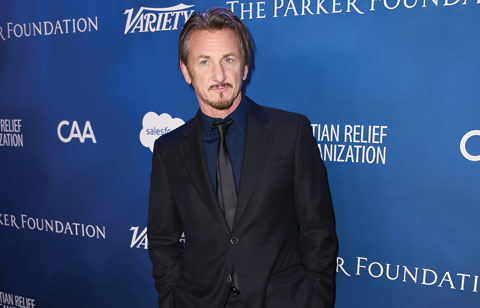Millions of people were surprised that actor Sean Penn was able to meet with escaped Mexican drug lord Joaquin "El Chapo" Guzman for an article that would make its way into the pages of Rolling Stone. Sean Penn was one of them. In an interview with CBS News anchor Charlie Rose on "60 Minutes" Sunday evening, the actor told Rose that he assumed Mexican officials were aware of what he was doing, and that the meeting was indeed a risk for Guzman as well as himself. "I was- I was stunned- that- that- that he w- would risk- our trip. I was stunned," Penn said in the interview, according to a transcript provided by CBS News. "I was baffled by his will to see us," Penn added later on in the talk.
Guzman was free after escaping one of Mexico's most secure prisons last July, making Penn's visit to see him exceedingly dangerous, and, some have charged, something that skirts the borders of journalist ethics. Among the reactions to the Rolling Stone article, published online January 9, were questions over whether Penn should have pressed for more answers regarding Guzman's many crimes and the effects his distribution of narcotics had on those who bought them.
But the actor rebuked the notion that he did not press Guzman harder on his transgressions. " I think the policy of the war on drugs, which so deeply affects all of our lives, seems not to change. It seems to be so unmovable. And it occurs to me that often, because we want to simplify the problem, and we want to look at a black hat and put our resources into focusing on the bad guy and na- and- and- and I understand that. I absolutely understand justice and- and the rule of law," Penn said. " And so I do what I call experiential journalism. I don't have to be the one that reports on the alleged murders or the amount of narcotics that are brought in. I go and I spend time in the company of another human being, which everyone is. And I make an observation and try to parallel that, try to balance that with the focus that we- that I believe we- we tend to put too much emphasis on."
Illuminate discussion
The actor, known for his roles in such film as "Fast Times at Ridgemont High," "Mystic River," "Milk" and "Dead Man Walking," acknowledged he gained access to "El Chapo" under the condition that the escaped convict would be able to kill the article if he didn't like what was written about him. "What was brokered for me to have the interview with El Chapo was that I would- finish the article, send it to him, and if he said no, then that was no harm, no foul to any reader," Penn said. Penn believes he failed to accomplish his goals, which was to talk about the US government's was on drugs. "We all want this drug problem to stop.
And if you are in the moral right, or on the far left, just as many of your children are doing these drugs, just as many of your brothers and sisters, your mothers and fathers, the teachers at school, are doing these drugs. Just as many,:" he said. "And how much time have they spent in the last week since this article come (SIC) out, talking about that? 1- 1%? I think that'd be generous." Even so, Penn said he has no regrets about his actions, and was simply trying to offer readers a look at a hard-to-reach figure in order to illuminate discussion around a heated issue. "I'm really sad about the state of journalism in our country," he told Rose. "It has been an incredible hypocrisy and an incredible- lesson in just how much they don't know and how disserved we are."-Reuters




